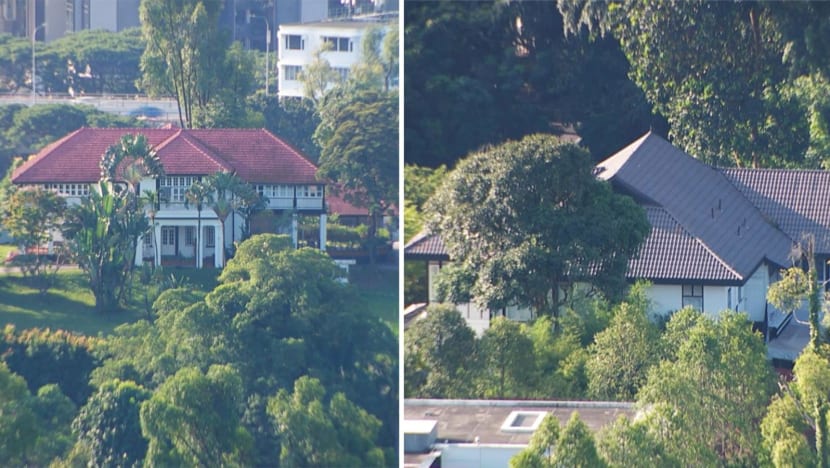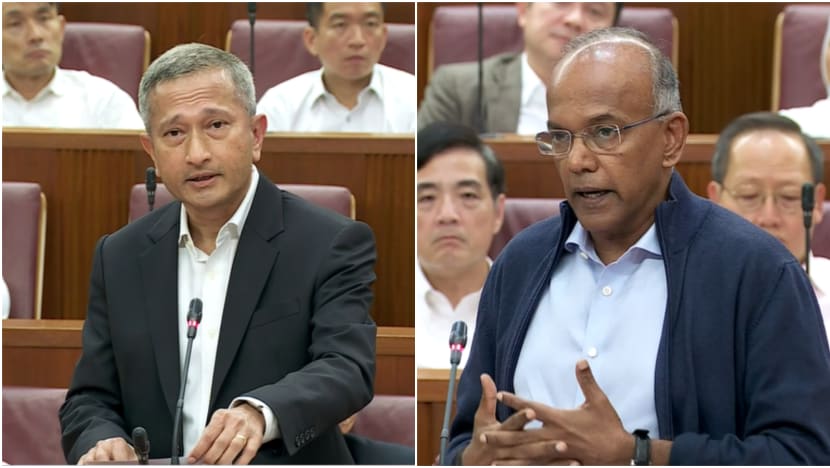Commentary: Ridout Road debate a reminder that public perception matters
After investigation into state properties rented by Ministers K Shanmugam and Vivian Balakrishnan found no wrongdoing, the parliament debate showed public concerns lie also in perceived conflicts of interest and inequality, says NTU political analyst Felix Tan.

The state bungalows at 26 and 31 Ridout Road were rented to ministers K Shanmugam and Vivian Balakrishnan.
SINGAPORE: To someone outside Singapore, the controversy surrounding the rental of two black-and-white colonial bungalows may seem to have taken an unusual turn – with Prime Minister Lee Hsien Loong directing a Senior Minister and the anti-corruption agency to look into the issue, culminating in a six-hour parliament debate on Monday (Jul 3).
Private decisions made about two homes along Ridout Road became of public interest after it became known that these were state properties leased to Law and Home Affairs Minister K Shanmugam and Foreign Affairs Minister Vivian Balakrishnan.
Mr Shanmugam said in parliament he was mindful as an elected official that “the lines between what is personal, and public may not always be clear”.
It is indeed worth contemplating whether this matter could have been effectively addressed without using parliamentary time to delve into the intricacies of personal financial affairs. But had there been no intervention at this level, the controversy would have been left to fester and potentially raised more questions about our public servants.
Initial concerns arose about whether there was improper conduct or preferential treatment. The Corrupt Practices Investigation Bureau (CPIB) investigation found no corruption or criminal wrongdoing. Senior Minister Teo Chee Hean’s review found the ministers, public officers and private sector intermediaries “conducted themselves properly” in the transactions.
The crux of the matter is rather one of accountability and public perception, and whether there was any conflict of interest. Did the long parliamentary debate and reports address people's concerns adequately?
PERCEIVED CONFLICT OF INTEREST?
Anyone in politics knows: Optics matter, not just the details of processes and procedures.
Mr Shanmugam reiterated Mr Teo’s report findings that there was no actual, potential nor perceived conflict, having recused himself from the decision-making process. The Singapore Land Authority (SLA), which rented out the Ridout Road bungalows, is a statutory board under the Ministry of Law, headed by Mr Shanmugam.
Members of Parliament (MPs) raised questions about the perceived conflict of interest, citing the ministerial code of conduct. It states that a minister must “scrupulously avoid any actual or apparent conflict of interest between his office and his private financial interests” and must “never enter into any transactions whereby his private financial interest might, even conceivably, come into conflict with his public duty”.
Even the appearance of impropriety can be tricky. Ministers cannot easily change public perceptions once they are formed. And the public has questioned why the ministers put themselves and their subordinates into a potentially compromising situation.
Though the Ridout Road review has also instigated a re-evaluation of the procedures concerning the disclosure of privileged information by public servants before renting government properties, it raises an important question.
Why were such measures not already in place? Even if such transactions are uncommon, should these not have been more thoroughly considered during the process of renting the Ridout Road houses?
However belated, the introduction of these measures signals a reactive but positive response to the matter. The Public Service Division, in collaboration with ministries and statutory boards, will work towards introducing a standardised declaration requirement for specific groups of officers. This additional layer of scrutiny will fortify existing practices and ensure that no public servant can obtain any perceived advantage.
CONCERNS OF FAIRNESS AND EQUALITY
The Ridout Road episode may remind some of a previous incident in 2009 when a permanent secretary – the highest-ranking civil servant in a ministry – wrote in local media about attending a famous French cooking school in Paris with his wife and son.
Be it renting colonial bungalows or taking expensive vacations, these decisions were made within the individuals’ means. So why does it matter to Singaporeans?

Some, concerned about income inequality in Singapore, view this as a divide between the "haves" and "have-nots" and question if ministers living in large bungalows “engender a picture of inequality”, in the words of MP Murali Pillai (PAP-Bukit Batok).
However, Mr Shanmugam argued that the empathy or ability to serve did not depend on how poor or rich one was. While that might be true, not everyone in society will necessarily view it the same way.
Yet, how our ministers and public servants conduct themselves is subject to public scrutiny, and decisions that may seem personal can be seen differently by the public. This cannot be avoided, especially when one is canvassing for votes to be an elected Member of Parliament.
Public servants should consistently exercise prudence and sensitivity in their decision-making, whether pertaining to personal matters or official responsibilities. This consideration is crucial in terms of optics and public perception.
There is a need to correct misperceptions that may undermine trust and confidence in governance. After all, these misperceptions can be maliciously used to spread unfounded rumours and speculate about the character of others.
But after the dust of proper conduct and conflict of interest settles on Ridout Road, it should also be a reminder that inequality is – and always will be – a hot-button issue for many societies.
As highlighted in the parliamentary debate, addressing inequality does not involve pulling down successful individuals; instead, it necessitates fostering social mobility and facilitating upward mobility for all.
Dr Felix Tan is a political analyst at Nanyang Technological University. He is co-author of Unmasking Singapore’s 2020 General Elections: COVID-19 And The Evolving Political Landscape, (Singapore: World Scientific, 2021).


















